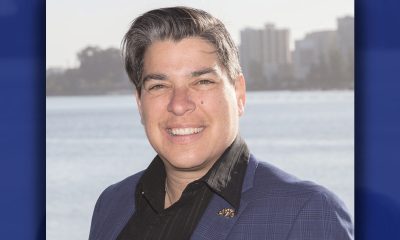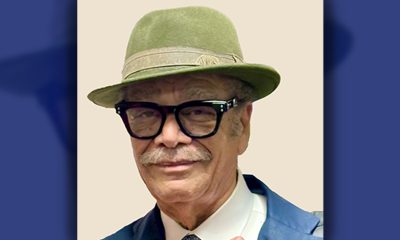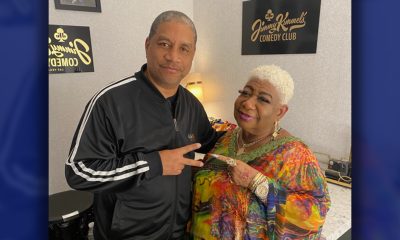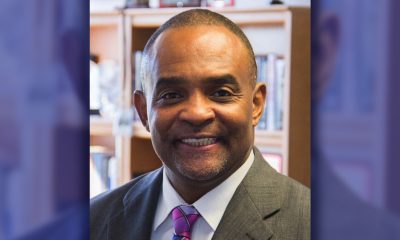Business
Pressure Builds for Feds to ‘Ban the Box’
By Freddie Allen
NNPA Senior Washington Correspondent
WASHINGTON (NNPA) – Seventeen states and Washington, D.C. have passed laws making it easier for ex-offenders to find jobs in the labor market. Now civil rights and community groups that advocate for returning citizens are pushing the White House to do the same.
Even though politicians on both sides of the aisle have warmed up to criminal justice reform and smarter sentencing policies, an estimated 70 million adults in the United States have arrests or conviction records and 9 in 10 employers conduct criminal background checks, according to a report by the National Employment Law Project (NELP), a workers’ rights group.
The Sentencing Project, a group that has advocated for criminal justice reform nearly 30 years, called the United States “the world’s leader incarceration with 2.2 million people currently in the nation’s prisons or jails – a 500% increase over the past thirty years.”
Blacks, who are nearly 13 percent of the U.S. population, account for 35.7 percent of state and federal prison population, compared to Whites who make up 32.8 percent.
“Our justice system is deeply unjust and unfair,” said Wade Henderson, the president and CEO of the Leadership Conference on Civil and Human Rights, a coalition of more than 200 national civil rights groups. “We often focus on the incarceration rate and the impact that policing and sentencing have on communities of color, but the injustice of our system is much more widespread.”
That’s because the United States continues to punish people long after they have paid their debts to society, said Henderson.
Most people who are convicted of crimes return to their communities, often facing greater challenges to finding affordable housing, educational opportunities and jobs.
“These barriers make it incredibly difficult for people to rebuild their lives and become the contributing members of society that we want them to be,” said Henderson. “As a result, millions of people are being left behind and left out.”
When those workers are left out, the economy suffers.
“Economists estimated that because people with felony records and formerly incarcerated people have poor job prospects, the nation’s gross domestic product in 2008 was between $57 and $65 billion lower than it would have been had they been gainfully employed,” stated the National Employment Law Project (NELP) report.
“Federal action is what’s right and is what’s needed as a matter of fairness, but without addressing the employment needs of the massive numbers of people with records who are locked out of the labor market, the economy suffers as well,” said Maurice Emsellem, the program director for NELP. “Especially in communities like Baltimore and elsewhere ravaged by criminal justice system.”
Some of the biggest companies in the United States are taking notice and revising their hiring policies to provide greater opportunities to ex-offenders.
KOCH Industries, worth more than $100 billion, recently joined Wal-Mart, Target and Home Depot to “ban the box” on job applications.
According to the NELP, “There are a total of 17 states representing nearly every region of the country that have adopted the policies —California (2013, 2010), Colorado (2012), Connecticut (2010), Delaware (2014), Georgia (2015), Hawaii (1998), Illinois (2014, 2013), Maryland (2013), Massachusetts (2010), Minnesota (2013, 2009), Nebraska (2014), New Jersey (2014), New Mexico (2010), Ohio (2015), Rhode Island (2013), Vermont (2015), and Virginia (2015).”
Six states have required that private employers remove the question about criminal background from job applications.
“These companies and states are seeing what the federal government hasn’t – that fair chance hiring isn’t just good for communities, it’s good for our economy,” said Henderson. “Certainly those industries would not adopt policies that hurt their bottom line and if they can show the kind of leadership, civic engagement and commitment to fair play in the workforce, then surely the federal government can follow behind.”
Andrea Marta, the campaign manager for Lifelines to Healing, an initiative of the PICO National Network, said that finding a job is the key to helping people return to their communities.
“Jobs help provide redemption and the second chance that many of our folks need to be successful once they come home,” said Marta. “People can walk away from the cycle of violence and poverty through a job that can prevent it.”
Dorsey Nunn, the executive director Legal Services for Prisoners with Children and the co-founder All of Us or None, said that it’s a contradiction to say that citizens can return to their communities after serving their citizens while depriving them of the rights and resources needed to get ahead.
Earlier this month, a group from PICO National Network that included ex-offenders met with White House officials and staffers from the Congressional Black Caucus to talk about recommendations for returning citizens facing employment and housing barriers.
Akim Lattermore, a community leader with the Ohio Organizing Collaborative said in a statement, “You can’t resolve policy issues surrounding fair hiring and the formerly incarcerated unless you have those impacted in the room.”
Emsellem said that “Ban the Box” legislation is also in compliance with current civil rights laws that require employers to take into account the age of the record directly related to job or rehabilitation programs that the applicant has completed.
In 2012, the Equal Employment Opportunity Commission (EEOC) released guidance on hiring practices, encouraging companies to be more mindful of how they use an applicant’s criminal background history in judging whether they’re qualified to do the job because they might unintentionally violate Title VII of the Civil Rights Act of 1964.
Emsellem said that the beauty of “ban the box” policies is their ability to isolate an applicant’s past criminal record, because those questions come at the end of the hiring process, after the employer has made every other decision. So it’s clear that the employer is judging the potential employee based on his ability or prior conviction.
Emsellem continued, “That creates a real opening and makes it way easier to argue these legal issues and puts the employer, honestly, in a really tough spot.”
Nunn said that if the federal government is going to spend his tax dollars, then he should have access to everything that they spend his money on. That includes jobs with companies that do business with and for the federal government.
“There are boxes all over the place that exclude me from access to a meaningful life,” Nunn said. “’Ban the box’ is more than a question of fair chance hiring. I want the full restoration of my civil and human rights and this is just the first step in the process.”
Bay Area
Pamela Price Appoints Deputy D.A. Jennifer Kassan as New Director of Community Support Bureau
On Monday, District Attorney Pamela Price announced Deputy District Attorney Jennifer Kassan as the new director of the Community Support Bureau. Kassan has over 25 years of experience as an attorney and advisor for mission-driven enterprises including benefit corporations, low-profit limited liability companies, nonprofits, cooperatives, hybrid organizations, investment funds, and purpose trusts.

Special to The Post
On Monday, District Attorney Pamela Price announced Deputy District Attorney Jennifer Kassan as the new director of the Community Support Bureau.
Kassan has over 25 years of experience as an attorney and advisor for mission-driven enterprises including benefit corporations, low-profit limited liability companies, nonprofits, cooperatives, hybrid organizations, investment funds, and purpose trusts.
Working in the DA’s new administration since 2023, Kassan was most recently assigned to the Organized Retail Theft Prosecution team.
Kassan has a master’s degree in City Planning from the University of California, Berkeley. She received a National Science Foundation Fellowship from Yale Law School, and graduated from Yale Law School in 1995. She earned her B.A. in Psychology with a minor emphasis in Ethnic Studies from UC Berkeley.
Kassan’s education, extensive legal background, list of notable accomplishments and impressive resume includes helping to found and lead multiple organizations to support community wealth building including:
- Community Ventures, a nonprofit organization that promotes locally-based community economic development,
- the Sustainable Economies Law Center, a nonprofit that provides legal information, training, and representation to support sustainable economies
- the Force for Good Fund, a nonprofit impact investment fund
- Crowdfund Main Street, a licensed portal for regulation crowdfunding
- Opportunity Main Street, a place-based ecosystem building organization that supports under-represented entrepreneurs and provides education about community-based investing.
In addition, Kassan served as an elected member of the City Council of Fremont, California from 2018 to 2024, and on the Securities and Exchange Commission Advisory Committee on Small and Emerging Companies.
In 2020 she was named to the list of World-Changing Women in Conscious Business by SOCAP Global.
“We are excited to see Jenny accept the role as the new leader for the Community Support Bureau,” said Price. “She brings a wealth of talent, experience, and a vision to expand our office’s engagement with community groups and residents, that will level-up our
outreach programs and partnerships with local organizations with the aim of promoting crime prevention.
“We thank Interim CSB Director Esther Lemus, who is now assigned to our office’s
Restitution Unit, for her hard work and a great job fostering positive relationships between the DAO and the community.”
Business
Sacramento Kings and Black-Owned Digital License Plate Firm Enter History-Making Partnership
Reviver founder and Chief Strategy Officer Neville Boston attended the Sacramento Kings’ season opener at Golden 1 Center, witnessing players debut the company’s patch. Reviver proudly supports the Sacramento Kings’ community and diversity, equity, and inclusion initiatives. Photo by Antonio Ray Harvey, California Black Media (CBM).

By Antonio Ray Harvey, California Black Media
Reviver, the world’s first digital license plate and connected vehicle platform, has entered into a history-making jersey patch partnership with the Sacramento Kings, team officials announced right before the team’s season opener on Oct. 24.
The collaboration establishes Reviver as the first Black-founded technology jersey patch partner in the National Basketball Association (NBA).
The Reviver logo now appears on the left front strap of Kings’ uniforms.
Reviver founder and Chief Strategy Officer Neville Boston was in attendance to see the company’s patch worn by the Kings, during a game with the Minnesota Timberwolves at Golden 1 Center in downtown Sacramento.
“It was an absolutely amazing night. More than I ever expected,” Boston told California Black Media (CBM). “The Sacramento Kings have been incredible. On a national, and maybe a worldwide level, this partnership raises the profile of Reviver with the assistance of (Kings chairman and CEO) Vivek Ranadivé and the Kings.”
According to the Kings’ brass, Reviver, supported by the Black Star Fund, a Black-led venture capital firm based in Sacramento, is now an official “innovation partner” of the Kings and Golden 1 Center; a presenting partner of “Capitalize Technology,” a King’s corporate social investment initiative; and the exclusive digital license plate of the Sacramento Kings.
Headquartered in Granite Bay, a suburb of Sacramento, Reviver was born from a vision to modernize and streamline the vehicle registration renewal process. On Jan. 1, 2023, the state of California joined Georgia, Colorado, Michigan, and Arizona as states that have approved digital license plates for use statewide, after Reviver completed a four-year pilot program that evaluated a replacement for metal plates.
About 10,000 California drivers bought digital plates during the pilot program. Vehicles registered with the state are eligible to adopt the new high-tech tags. Reviver existence was made possible when Gov. Gavin Newsom signed Assembly Bill (AB) 984 in September 2022.
Under that law, California vehicle owners can update their titles, registrations, and other records remotely. In addition, the digital license “RPlate” includes a flashing message if a vehicle is reported stolen or if there is an Amber Alert.
Ranadivé is spreading the news that Reviver has international potential.
“This jersey patch partnership with Reviver continues the Kings long tradition of using our global platform to promote innovation and technology,” Ranadivé stated. “It’s particularly exciting to showcase a homegrown company that was part of our Kings Capitalize program. This is just the beginning of our work together, and we look forward to helping Reviver in its mission to modernize the driving experience.”
The commercial use of patches in professional basketball all began in 2009 when the Women’s Basketball Association (WNBA) Phoenix Mercury removed its name to replace it with sponsor, LifeLock, an identity-theft protection company. The landmark deal netted a contract worth about $1 million annually.
Kindra Montgomery-Block, vice president of diversity, equity, and social impact for the Sacramento Kings, was the integral facilitator who assisted Boston and his team in connecting with the sports franchise that is boasting 40 years in the Capital City.
“This partnership between the Kings and Reviver, backed by the Black Star Fund, will invest in the Sacramento community to promote technology and innovation in the region,” Montgomery-Block stated. “Reviver will support the Sacramento Kings community and diversity, equity, and inclusion initiatives.”
Editor’s Note: Neville Boston is a California Black Media board member.
Activism
NAACP California-Hawaii State Convention Highlights Black Voter Engagement, and More
A Friday panel featuring NAACP Chairman Leon W. Russell and Regina Wilson, Executive Director of California Black Media, examined Project 2025, an initiative perceived as a potential threat to civil rights, healthcare access, and environmental protection. This session emphasized Project 2025’s projected impact on Black communities, noting that policies within the initiative could diminish gains in civil and environmental rights over decades. Russell and Wilson highlighted the need for vigilant monitoring and community mobilization to address these challenges.

By Bo Tefu, California Black Media
The 37th NAACP California-Hawaii State Convention concluded on Sunday, Oct 27, following four days of discussions and workshops at the Los Angeles Airport Marriott. Bringing together civil rights leaders, policymakers, and advocates from California and Hawaii, the convention operated under the theme “All In.” The participants discussed critical issues impacting Black communities, including criminal justice reform, health equity, economic empowerment, education, environmental justice, and voting rights.
A Friday panel featuring NAACP Chairman Leon W. Russell and Regina Wilson, Executive Director of California Black Media, examined Project 2025, an initiative perceived as a potential threat to civil rights, healthcare access, and environmental protection. This session emphasized Project 2025’s projected impact on Black communities, noting that policies within the initiative could diminish gains in civil and environmental rights over decades. Russell and Wilson highlighted the need for vigilant monitoring and community mobilization to address these challenges.
On Saturday, the President’s Fireside Chat brought together NAACP President Derrick Johnson and CA/HI State Conference President Rick Callender, who discussed the urgency of voter engagement and community advocacy.
Guest speakers included Congresswoman Maxine Waters (D-CA-43), who spoke at the Women in NAACP (WIN) Labor Luncheon about the intersection of labor rights and civil rights. California State Superintendent Tony Thurmond delivered remarks at the Leadership Dinner on education equity, focusing on policies to ensure all students have access to high-quality education.
Honors were given to longtime social justice advocate and former Assemblymember Mike Davis for his work in community activism. At the same time, actor and activist Danny Glover and the Rev. Dr. Amos C. Brown received the 2024 Legacy Hall of Fame Awards, recognizing their lifelong commitments to advancing civil rights.
The convention also offered practical workshops, including “What’s On Your Ballot?,” where coalition leaders provided analyses of California propositions, explaining their potential impacts on community rights and resources. The Voter Turnout Workshop provided background and encouraged participants to promote voter turnout through community-centered outreach strategies.
Sunday’s events closed with a Prayer and Memorial Breakfast honoring the contributions of past and current civil rights leaders.
-

 Alameda County1 week ago
Alameda County1 week agoAlameda County District Attorney Pamela Price Announces $7.5 Million Settlement Agreement with Walmart
-

 Activism2 weeks ago
Activism2 weeks agoOP-ED: Hydrogen’s Promise a Path to Cleaner Air and Jobs for Oakland
-

 Activism3 weeks ago
Activism3 weeks agoCOMMENTARY: DA Price Has Done Nothing Wrong; Oppose Her Recall
-

 Activism3 weeks ago
Activism3 weeks agoBarbara Lee, Other Leaders, Urge Voters to Say ‘No’ to Recalls of D.A. Pamela Price, Mayor Sheng Thao
-

 Community2 weeks ago
Community2 weeks agoTerry T. Backs Oakland Comedy Residency by Oakland’s Luenell at Jimmy Kimmel’s Comedy Club in Las Vegas
-

 Bay Area3 weeks ago
Bay Area3 weeks ago2024 Local Elections: Q&A for Oakland Unified School Candidates, District 3
-

 Activism3 weeks ago
Activism3 weeks agoOakland Post: Week of October 9 – 15, 2024
-

 Business2 weeks ago
Business2 weeks agoStudy Confirms California’s $20/Hour Fast Food Wage Raises Pay Without Job Losses





























































